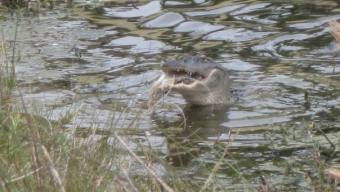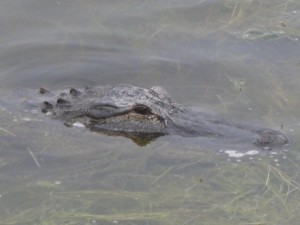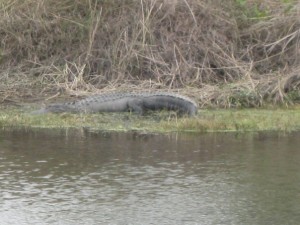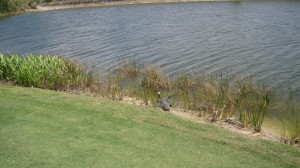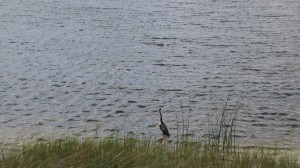Golf can’t be compared to such dangerous sports such as football, car racing or downhill skiing. Those are virtually sissy sports compared to a round of golf.
What other sport – with the possible exception of gladiator duels – can you be mauled by alligators just for hitting a wedge to the green.
It happen this week to one unfortunate chap in Lake Wales, Fla. As a 75-year-old duffer was searching for balls near a pond, an alligator sprung out of the water and grabbed his left knee and started pulling him into the water.
His playing partners rushed to his aid, pulling him back and pushing back on the gator to save him. If that nine-footer had pulled him under, he would have been a meal. Talk about a difficult hazard. Compared to that experience, LeBron James, Albert Pujols. Tony Stewart and Aaron Rogers have it easy.
The victim needed 40 stitches to close up his 10-inch wound. No word on what he took on the hole. Here’s his story.
Like great white shark attacks, this kind of gator incident is rare. But they do happen. Three years ago on a course in South Carolina, a man reached to pick up a ball in the water and a 10-foot gator grabbed him and pulled him into the water. First time, you suspect, he was one-under.
The gator spun the man around several times until he lost his arm, which didn’t help his handicap.
You got to be tough to play this game.
Gator golf is actually common in Florida and many of the southern states where the creatures co-exist with golfers. Generally, they don’t bother the golfers. They’ll sit on the bank or just under the water and stare. They are actually a novelty for the out-of-state visitors. The locals allow a wider berth.
Two weeks ago, I played golf in southwest Florida, the Naples area just north of Marco Island. Essentially, you can not find a course in that area that does not have gators.
If you’re going to have a course in that part of Florida, you’re going to have water. The gators move around from waterway to waterway looking for food and habitat. At times, the course manager has to call in the wildlife specialists to remove a pesky one or two but they usually don’t bother anyone.
That area of Naples has plenty of very nice courses, such as Lely, Grey Oaks, Kensington, Twin Eagles, Forest Glen, Royal Palm, Fiddler’s Creek and Hammock Bay. Gators roam them all. They might make you a little quicker on the backswing.
My group played Fiddler’s Creek two weeks ago and it’s quite a challenging course. It’s long. The grass is grabby. The hazards are unforgiving – treacherous if you encounter a gator. We saw one on the bank of a pond along the 16th green. He was a bit unusual since he held his head up slightly as he stared us down. They usually don’t maintain that position unless he’s ready to strike or defend his turf.
On another hole we noticed a black cormorant standing on the bank looking for a meal. We followed a gator as well, sinking silently into the water about 50 yards away and making his way slowing toward the bird. We didn’t stick around to witness this Wild Kingdom episode but figured that bird was smart enough take flight before it got serious.
A year earlier while playing Hammock Bay, my favorite Naples course, we saw a white cormorant that wasn’t so lucky. On the par-3 second hole, we noticed a disturbance on the other side of the pond near the green. It was there we saw the bird halfway down the gator’s throat (see picture at the top).
We also saw another gator that day about 15 feet long with the stomach that could almost fit a foursome.
Gator golf is not really a fearsome activity, if you don’t do stupid things. The main thing is to be particularly watchful on the edges of the water. Don’t linger too long. Don’t turn your back. Don’t go splashing around trying to retrieve a ball. It’s a rare thing, but they can surprise you with their attacks, springing from a dark place in the water and suddenly chopping down an appendage. That just contributes to higher scores and slower play.





